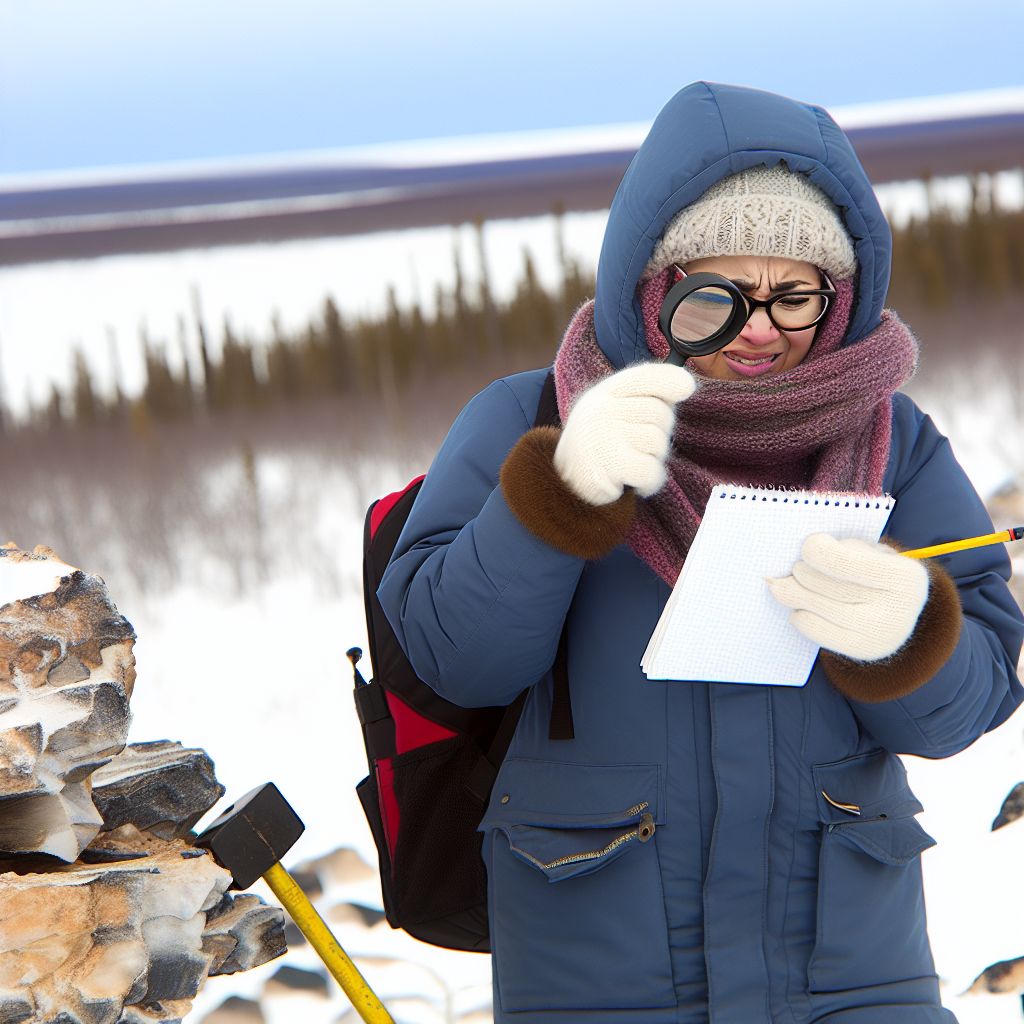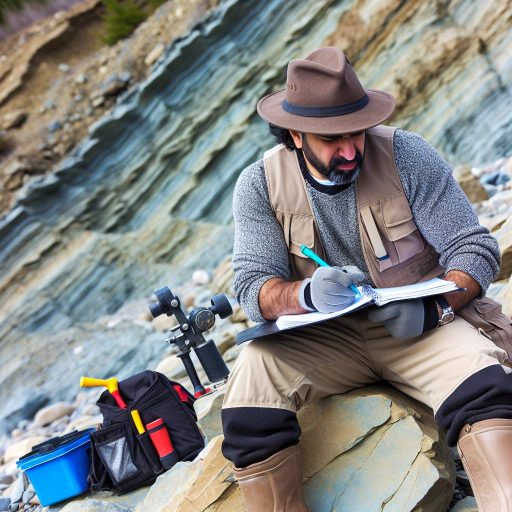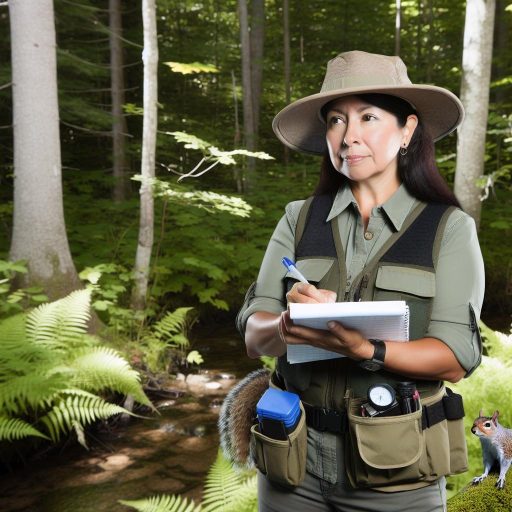Overview of the Geologist Profession in Canada
Significance of Geologists
Geologists play a crucial role in understanding Earth’s processes.
Their work contributes to natural resource management and environmental protection.
Moreover, geologists help in disaster preparedness and response efforts.
Educational Pathways
A career as a geologist typically requires a minimum of a bachelor’s degree.
Many universities in Canada offer specialized geology programs.
Additionally, pursuing a master’s degree can provide further expertise.
Practical experience through internships or fieldwork is highly beneficial.
Key Skills Required
Geologists must possess strong analytical and critical-thinking skills.
Effective communication skills are essential for conveying complex information.
Furthermore, proficiency in scientific software and tools is important.
Work Environments
Geologists work in various settings, including laboratories, field sites, and offices.
The mining and energy sectors are significant employers of geologists.
Additionally, government agencies and environmental consulting firms also hire them.
Professional Organizations
Joining a professional organization can greatly benefit geologists.
Organizations like the Canadian Geoscience Education Network offer valuable resources.
Members gain access to networking opportunities and continuing education.
Job Outlook and Opportunities
The demand for geologists in Canada continues to grow.
This is due to increased focus on sustainable resource management.
Emerging fields such as environmental geology present new job prospects.
As a result, opportunities for career advancement are promising.
Regional Opportunities
Geological careers vary across different provinces and territories.
British Columbia and Alberta are known for their strong resource sectors.
On the other hand, the Atlantic provinces focus more on environmental assessment.
Understanding regional demands can enhance job prospects for geologists.
Typical Career Path for Geologists
Starting Point: Entry-Level Positions
Many geologists begin their careers in entry-level positions.
Unlock Your Career Potential
Visualize a clear path to success with our tailored Career Consulting service. Personalized insights in just 1-3 days.
Get StartedThis often includes roles such as geological technicians or field assistants.
These positions provide essential hands-on experience.
New professionals learn the basics of data collection and analysis.
Working for mining companies or environmental firms is common.
Illinois Rock Company or Marland Resources are notable employers.
Advancing to Intermediate Roles
After gaining experience, geologists typically advance to intermediate roles.
This stage often includes positions like project geologist or exploration geologist.
Geologists take on more complex tasks during this phase.
They may lead field studies and manage teams of junior staff.
Additionally, they begin specializing in specific areas, like hydrogeology.
Networking with industry professionals can facilitate this transition.
Reaching Senior-Level Positions
With years of experience, geologists can attain senior-level positions.
Titles such as senior geologist or chief geologist are common.
In these roles, geologists oversee large projects and mentor junior staff.
Strategic planning and resource management become primary responsibilities.
Moreover, they often represent their companies at industry conferences.
Joining organizations like the Canadian Geological Association may be beneficial.
Potential for Specialization
Specialization offers significant career growth opportunities for geologists.
Geologists may focus on areas such as environmental geology or mineral exploration.
Advanced degrees can enhance their expertise and job prospects.
Certification from professional organizations can elevate their standing.
A specialization often leads to roles in consulting or research.
Opportunities for Leadership
Many geologists aspire to leadership roles within their organizations.
Such positions include project manager and department head.
Leadership roles require strong communication and decision-making skills.
Successful geologists help shape company strategies and initiatives.
Active participation in industry groups can enhance leadership opportunities.
Continual professional development is essential for success in these roles.
Educational Requirements for Aspiring Geologists
Foundation of Knowledge
A strong foundation in geology begins with a bachelor’s degree.
This degree often includes courses in mineralogy, petrology, and geophysics.
Many universities also encourage fieldwork to enhance practical knowledge.
Students should consider accredited programs for the best educational experience.
Pursuing Advanced Degrees
A master’s degree can significantly enhance career prospects in geology.
This advanced education allows for specialization in various fields.
Areas of focus might include environmental geology or petroleum geology.
Moreover, a Ph.D. is essential for those interested in academic or research positions.
Licensing and Certification
Obtaining a professional designation is vital for career advancement.
In Canada, geologists often pursue the designation of Professional Geoscientist (P.Geo).
This requires completing a recognized degree and gaining relevant work experience.
Additionally, passing a professional practice examination is crucial.
Continuing Education
Continuing education keeps geologists updated on industry trends.
Workshops, seminars, and courses offer valuable knowledge and skills.
Many professional organizations provide resources for ongoing learning.
Engaging with these opportunities drives career growth and innovation.
Networking Opportunities
Participating in industry conferences facilitates professional networking.
Connecting with peers opens doors to collaboration and mentorship.
Joining geological associations enhances visibility in the field.
These networks can lead to job opportunities and professional growth.
Find Out More: Key Responsibilities of an Epidemiologist
Certifications and Professional Development Opportunities in Geology
Importance of Certifications
Certifications enhance a geologist’s credibility and career prospects.
Employers often prefer candidates with recognized certifications.
These credentials demonstrate commitment to the profession.
Types of Certifications
Several certifications are available for geologists in Canada.
- The Professional Geologist designation is highly regarded.
- Obtaining a Certified Engineering Technician certification can be beneficial.
- Membership in the Canadian Institute of Mining, Metallurgy and Petroleum is advantageous.
Professional Development Programs
Geologists can participate in various professional development programs.
Workshops and conferences provide valuable learning opportunities.
Networking events facilitate connections with industry experts.
Online courses offer flexibility in skill enhancement.
Networking and Mentorship
Networking plays a crucial role in career advancement.
Joining professional associations can lead to mentorship opportunities.
Mentorship helps in navigating career challenges and growth.
Continued Education Resources
Many universities offer advanced degrees in geology.
Continuing education allows for specialization in emerging fields.
Online platforms also provide courses on geological technologies.
Continuous learning keeps professionals updated with industry trends.
Gain More Insights: Future Trends And Innovations In Physics Careers
Industry-Specific Opportunities
Mining Sector
The mining sector offers diverse career options for geologists in Canada.
Many companies seek geologists for exploration and production roles.
Positions often focus on mineral assessment and resource management.
Geologists can specialize in precious and base metals or industrial minerals.
Fieldwork is a key component, enabling hands-on exploration experience.
Opportunities also exist in mine planning and environmental assessment.
Leading firms like Barrick Gold and Teck Resources actively hire geologists.
Environmental Sector
The environmental sector values geologists for their expertise in land and water management.
Roles often involve assessing contamination and environmental impacts.
Geologists contribute to sustainable practices in land-use planning.
They conduct site assessments and develop remediation strategies.
Companies like Golder Associates and Stantec frequently employ geologists.
Job openings include positions in consulting and regulatory compliance.
Oil and Gas Sector
The oil and gas sector presents lucrative career prospects for geologists.
Geologists play vital roles in reservoir characterization and exploration.
They work on projects that require geological mapping and modeling.
Field studies are essential for understanding subsurface geology.
Geoscientists also collaborate with engineers on drilling operations.
Major companies like Suncor and Enbridge continually seek talented geologists.
Positions vary from field geologist to senior exploration manager.
Uncover the Details: Popular Workplaces for Ecologists in Canada

Emerging Trends in Geology: Technologies and Research Innovations
Advancements in Geospatial Technology
Geospatial technology is revolutionizing geology today.
Innovative tools enhance data collection and analysis.
GIS and remote sensing are now commonplace in field studies.
These technologies provide detailed insights into geological features.
Moreover, they allow for real-time data sharing among teams.
Artificial Intelligence in Geological Research
Artificial intelligence plays a crucial role in modern geology.
Machine learning algorithms analyze complex geological data.
This reduces the time required for research and analysis.
AI-driven models can predict geological events and trends.
Consequently, researchers can make informed decisions faster.
Emphasis on Sustainable Practices
Sustainable geology is gaining significant attention.
Geologists now prioritize environmental impacts in their work.
Research includes methods for resource management and conservation.
This approach ensures minimal disruption to ecosystems.
Consequently, it aligns with global sustainability goals.
Collaboration Across Disciplines
Modern geological research increasingly involves interdisciplinary collaboration.
Geologists partner with ecologists, engineers, and data scientists.
This approach fosters diverse perspectives on complex problems.
Valuable solutions emerge from these collaborative efforts.
Ultimately, teamwork enhances the quality of geological studies.
Emerging Resource Exploration Technologies
New technologies are reshaping resource exploration.
Advanced drilling techniques increase efficiency and accuracy.
3D modeling provides a clearer picture of subsurface geology.
Furthermore, innovative seismic surveying techniques enhance data collection.
These developments optimize resource extraction and minimize risks.
Gain More Insights: How Epidemiologists Use Data to Save Lives
Networking and Professional Associations for Geologists in Canada
Importance of Networking
Networking plays a crucial role in advancing a geologist’s career.
It helps professionals connect with industry experts and peers.
Consequently, these connections often lead to job opportunities.
Moreover, networking fosters collaboration on projects and research.
Key Professional Associations
Various professional associations support geologists in Canada.
The Canadian Institute of Mining, Metallurgy and Petroleum is one such organization.
This association offers resources, events, and networking opportunities.
Members can access industry news and professional development workshops.
Another important body is the Geological Association of Canada.
This association promotes geological science and education across the country.
It provides a platform for geoscientists to share research and expertise.
Local Networking Opportunities
Participating in local geological societies can enhance networking prospects.
Many regions in Canada host geological clubs and meetups.
These gatherings facilitate the exchange of ideas and experiences.
Attending lectures and workshops can expand your professional circle.
Conferences and Events
Conferences provide excellent opportunities to network with experts.
The Annual Geological Conference is one of the largest events.
This event features presentations from top professionals in the field.
Networking sessions at conferences often lead to lasting connections.
Utilizing Social Media
Social media platforms can enhance a geologist’s networking efforts.
LinkedIn offers opportunities to connect with industry professionals.
Joining relevant groups can lead to discussions and information sharing.
Additionally, Twitter can be useful for engaging in geological conversations.
Volunteering and Mentorship
Volunteering for geological organizations can increase visibility.
Many associations seek volunteers for events and outreach programs.
Moreover, finding a mentor is invaluable for career growth.
Mentorship can provide guidance and introduce you to key contacts.
Geologists in Government and Academia: Career Options and Growth Potential
Career Options in Government
Government positions offer diverse opportunities for geologists.
Federal and provincial agencies regularly seek geological expertise.
Roles often include environmental assessment, resource management, and policy development.
Geologists can work in various departments, including natural resources and environmental protection.
Additionally, some may focus on geohazards and mineral exploration.
Benefits of Government Positions
Government roles provide job security and benefits.
They often include pensions, health care, and professional development opportunities.
Moreover, these positions allow geologists to influence public policy.
Working in this sector can also enhance professional visibility and credibility.
Academic Opportunities
Academia presents another attractive career path for geologists.
Universities and colleges frequently hire geologists for teaching and research.
Positions range from faculty members to research associates.
Such roles require advanced degrees, typically a master’s or doctorate.
Pros of an Academic Career
An academic career fosters intellectual growth and ongoing research.
Professors can mentor students and influence future geoscientists.
Additionally, they can publish research findings in reputable journals.
These roles often allow for flexibility in work schedules.
Collaborative Opportunities
Geologists within government and academia often collaborate.
This collaboration can facilitate interdisciplinary research projects.
Furthermore, partnerships can enhance funding opportunities.
Joint efforts may tackle global challenges such as climate change and resource management.
Networking and Professional Development
Engagement in professional organizations is critical for career advancement.
Organizations such as the Canadian Geological Association provide networking events.
These gatherings enable geologists to share insights and connect with potential collaborators.
Ultimately, continuous learning and professional development are essential.




